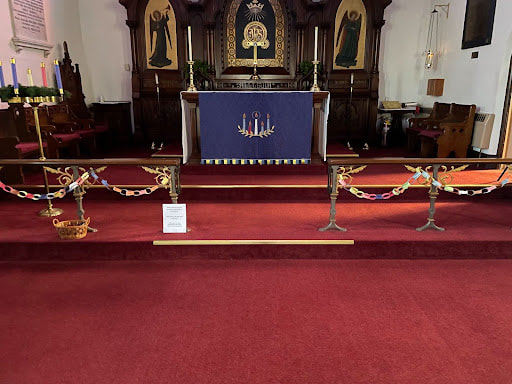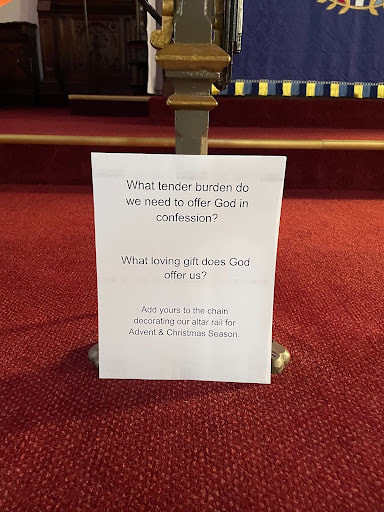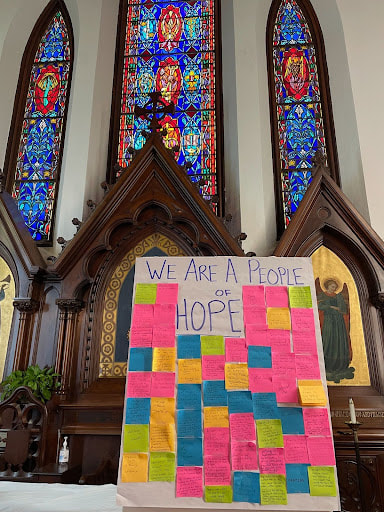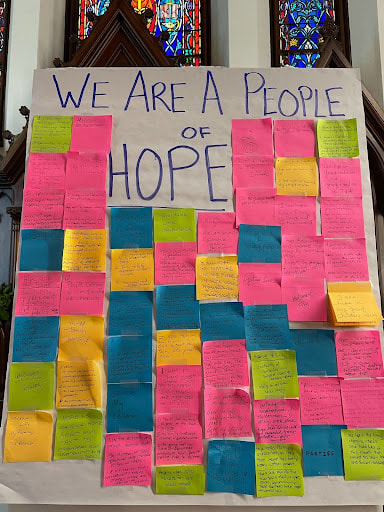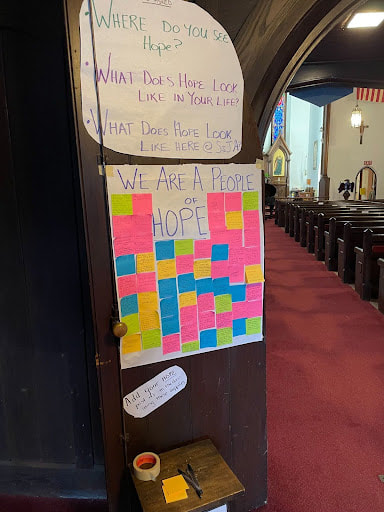|
Rev. Jimmy Pickett 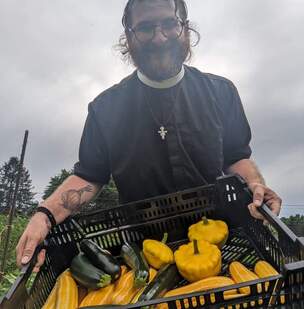 Christmas Propers III - Isaiah 52:7-10, Hebrews 1:1-4, Psalm 98, John 1:1-14 +What can I give him, poor as I am? If I were a shepherd, I would bring a lamb; if I were a wiseman I would do my part; yet what I can I give him- I give my heart. In the name of Emmanuel, God with us. Amen+ “We have all known the long loneliness…” These words of the prophet Dorothy Day ring true today, just as they did 90 years ago when she founded the Catholic Workers, and still even in that little town of Bethlehem some 2000 years ago. This holy night shines with a bright light, yet it is like every other night. There is a profound sadness throughout the world this night, even in the little town of Bethlehem, where celebrations of this great Feast are quiet and somber, yet hopeful in the midst of fear. In many ways, this Christmas is much like that first Christmas when an exhausted family, after a challenging year, was suddenly surprised by love beyond measure. The loneliness and fear of the Holy Family was in that moment transformed and that cold and empty barn became a home for a night, even if that night was fleeting. The Presence of God in the face of another human caused love to pour out the door and fill the streets with neighbors who may not have even known each other's names the night before. No matter where you have been this year, no matter where you will be tomorrow, tonight you are here in this building that is made holy by the Light of God shining in the face of another human. This year, we don’t hear Luke’s familiar and comforting story of the little baby in the manger, surrounded by the animals, shepherds, and angels in the time of the registration under Emperor Agustus. Instead we hear John’s testimony of Word and Light becoming Flesh. Many scholars like to pick on John, saying that Jesus tends to float through the Gospel, never really touching the ground. But tonight we hear quite the opposite! That Word that lovingly spoke Creation into being and that Light that shines bravely and boldly against all the heartbreaking chaos of the world, becomes Flesh (slap shoulder)! The God of all things, out of love at hearing our outcry, became one of us! Throughout John’s Gospel, Jesus is revealed through the simple and tangible material things that give us human creatures comfort. I am Light, so that you can see those you love. I am the Gate, protecting you. I am the Good Shepherd, leading you beside still waters and comforting you when you’re afraid. I am the Resurrection, I promise you will see them again. I am the Way, so you will never be lost or alone. I am the Vine and the Bread, you will never be hungry or thirsty when you gather together with your neighbors because I am with you. Yet we have all known the long loneliness and this night is like any other night. Tonight we will have the chance to hold in our hands the one who has held us from the beginning. One line of a hymn from the monastic tradition speaks to the particular holiness of this night “O wondrous interchange, the creator of humanity taking on a living body, willed to be born of Mary, coming forth into the world as a human, has made us partakers of Divinity”. As we gather together to celebrate the Eucharist, we are united to this wondrous interchange, we become partakers in this Divinity and that Word and that Light of God shines through us, we are fed in order to feed others. The miracle of the Incarnation is that all the beauty and sorrow, the joy and pain, the fellowship and yes the loneliness of life, is felt and known deeply by our God. No matter what this year, or all the years of your life have thrown your way, know that you have come to this night as one who is beloved. In her Revelations of Divine Love, Julian of Nowrich has a vision where she meets Jesus and she tries to cover her body, because she is ashamed of what life had done to her. She is ashamed of the scars and the brokenness because the world told her she should be ashamed, but Jesus gently moves her arm and says your scars are beautiful because they are proof that you lived. As you come forward for Communion tonight, know that God is touching you with the same motherly tenderness that touched Julian in her vision and behold in that little piece of bread what you are and become that same incarnate love for someone else this season. Just a few nights ago, on the longest night of the year, I was reminded of how simple it can be to share this light of love incarnate. I had been sitting in my living room, reading Dorothy Day’s autobiography, when out of the deep blue depth of that long night I got a message from a friend I haven’t seen in months. It was simple “Hey! Totally last minute impromptu, we’re holding a longest night of the year Compline, here’s the zoom link”. A simple gift. Light shone through the lonliness of that longest night as friends from up and down the east coast, from Massachusetts to Florida, came together to bear witness to that Word made Flesh. We shared stories and laughed and prayed and spent an hour together even though we were all incredibly busy with Christmas preparations. But that’s what Jesus does, breaking into the busyness, and the ordinary, and the lonely, and the day to day moments of life, to reveal the Love of God in the face of another person. I want to leave you with the closing quote from Dorothy Day’s The Long Loneliness to reflect on throughout our Christmastide celebrations. “We have all known the long loneliness and we have learned that the only solution is love and that love comes with community. It all happened while we sat there talking, and it is still going on.” The Word became flesh and dwelt among us, and it all happened while we sat there talking, and it is still going on. Amen. By Julie Carew, Lay Preacher 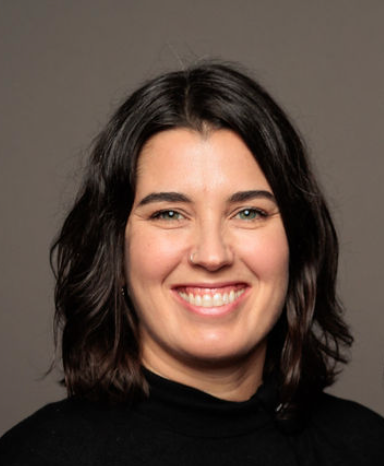 Creator and Sustainer, thank you for these illustrations of being your Beloved ones- of what it looks like to be blessed, chosen, cared for and called by You. Amen The passages in today’s liturgy bring us some beautiful stories of being God’s people: In Isaiah we hear about what it can look like to be filled with the spirit of God, to belong to God. Here, God’s people bring good news, they help others, they seek and provide for the good of others. It doesn’t say there won’t be hardship and mourning, but that they will be brought out of it, comforted, transformed. In her Song in Luke, Mary is rejoicing in and celebrating what God has done and is doing for her. She is recounting God’s mercy, strength against evil, care for those who are in need, and faithfulness. In the Gospel reading, we hear from John the Baptizer, starting with what he is NOT- the Messiah, Elijah, a prophet. He says “I am the voice of one crying out in the wilderness…” and we read that “He came as a witness to testify to the light, so that all might believe through him.” The word that has been occupying space in my brain as I sit with these passages is WITNESS. I know I’ve had several occasions in my life where I was seeing something happen and I reminded myself to pause and take it all in, knowing I was witnessing a significant event. When we know we are witnesses, we pay attention and take it all in so that we can remember and share what we have observed and experienced, and that seems to be what is happening in all of these passages. Isaiah is recounting a history, giving credit where it is due. Mary is celebrating and proclaiming all that God has done and giving thanks. John is demonstrating and telling of what he has heard from God and how it has impacted his life, pointing others towards God. They are all WITNESSING to who God is and what God has done- remembering and treasuring it for themselves and sharing it with others. In 1 Thessalonians we read what Paul wrote to those to whom he had witnessed in Thessalonica. This letter is likely not only the first of Paul’s letters to be preserved for us, but the earliest surviving Christian writing, dating just 15-20 years after the crucifixion. Paul spent a few intense months living, working and spreading word about Jesus in Thessalonica, the leading city in Macedonia, before he and his traveling companions were forced out. This letter is written as a response to the news brought back from Timothy that the Thessalonians were standing firm in their faith and continued to hold Paul and his companions in high-esteem, and he seemingly writes it intending to build them up and celebrate them. Through this beautiful letter, we sense the deep love and affection Paul has for these people he taught, lived and worked among. Throughout 1st Thessalonians we see glimpses of how he shared life and the Gospel with them, what he saw as essential in the foundation of their faith and his hopes for them in the future. He praises them for their work and faithfulness, encouraging them to continue on as they have been. Paul also addresses their concerns about those they have lost, reassuring them that their loved ones will not be left behind by God. It’s clear in many of Paul’s teachings that he expected Jesus to return during his lifetime and preached with that urgency in mind. And in this letter, he reassures them that the promise of Jesus’ return still stands, if on a different timeline than he originally expected. He encourages them to continue on in love, peace, kindness, patience and goodwill, as they await Christ’s return. It’s in that context that we find today’s passage from 1 Thessalonians 5. Here we read Paul’s final words in this letter to this community that is cherished by him and has undergone many challenges and trials. I have to believe that, knowing what they have been through and that they may be losing hope, he purposely doesn’t leave them with more to do, or challenge them to do better or harder, but with reminders of what is essential on their journey. He begins with “Rejoice always, pray without ceasing, give thanks in all circumstances”. “Rejoice” is translated from the Greek word, Chairo (khah'-ee-ro)- to rejoice, be glad, to rejoice exceedingly, to be well, thrive And “Always” from Pantote (pan'-tot-eh)- at all times, always, ever- in the King James Version, this word is translated as “evermore”. What does it look like to rejoice always? I would posit that this is not about being happy all the time. In fact, there are other places in the Bible where this same word, “Chairo” is translated as “be glad”, but not here. I see this more as a call to reflection, to taking time to process and find joy and then, perhaps, to share it. I think that, knowing full well the trials they are facing, he is encouraging them to find joy in all that they can. What does it look like to pray without ceasing? Paul uses this same word for “without ceasing” in Romans 1:9 in reference to specific people he is praying for. We see then that this can’t be a literal “constantly”, but rather seems to be explaining a posture, a practice of being always in communication with God about the things that are on our hearts and minds. Prayer is a conversation, an ongoing conversation with God. If we start our days remembering that we are of God, and reminding ourselves of who God is, it seems likely that we will be able to freely access that conversation throughout our day. When we notice something beautiful, we give credit to the creator and allow ourselves space to be awed. When we are challenged by something, we remember that we can ask for help. When we feel the loss of someone missing from our lives, we remember that we are not alone in that loss, and have a companion through it. What does it look like to give thanks in all circumstances? To take what we are rejoicing in and in communion with God and with others, to give credit where it is due, giving thanks to God. This strengthens our connection to God, and invites us into a posture of gratitude within it. Paul’s words here are simple and concise, but not tasks that can be taken lightly; he gives them three things they simply can’t do without acknowledging they are beloved creations of God and everyone else is too. In them, they must acknowledge where everything comes from, hear and accept guidance, cling to their Creator, their value and purpose, and be grateful for those who have entered into their realm. Paul then says, “for this is the will of God in Christ Jesus for you.” I think this is maybe the most important phrase here. He is saying that these are not rules to follow, but that this is what God WILLS for God’s people, this is how God created them (and us) to be, in continuous communication with our Creator, noticing and appreciating the creation around us and the connection we have with all of it. Paul goes on to encourage the Thessalonians to celebrate and look for opportunities to be guided by the still small voice that is the Spirit living in them, whether in wrestling with the writings and teachings that are challenging to them or distinguishing good from evil. Paul then blesses the Thessalonians, “May the God of peace himself sanctify you entirely and may your spirit and soul and body be kept sound and blameless at the coming of our Lord Jesus Christ. The one who calls you is faithful and he will do this.” These are beautiful, encouraging words. Our goodness, our worthiness, our blamelessness comes from being a creation of God and our relationship with God as our Creator. So what does this mean about our witness as followers of Jesus? For Mary, witnessing meant trusting what seemed impossible and sharing what she knew of God, even when all the pieces didn’t quite make sense. For John the Baptist, it meant wearing camel's hair, eating locusts and wild honey, wandering in the desert, calling for folks to prepare themselves for relationship with God, and baptizing them. As interesting as that sounds, I think I’ll take to heart what Paul is saying here to his friends, the Thessalonians- that being people who draw their value and that of others from being part of God’s creation and investing in being part of God’s community, is their witness. I believe (and it sounds like Paul did too) that God created us to notice, to draw joy, to find hope and to be in continuous communion with God. We don’t have all the answers, but we know the source of those answers and can rest and trust in that. We can find joy when it seems impossible, and we seek more, better and truer relationship with God and with each other. Paul gave the Thessalonians a gift in this letter, a reminder that it’s in God’s presence and our practicing of that presence that we find what we need. Will we also accept that gift as we journey through Advent? Let us be this kind of witness- Rejoicing Always, Praying without Ceasing, and Giving Thanks in All Circumstances. (Or at least head in that direction…) As we daily face a world with so many things we will never make sense of, let us cling to our Creator and know that we are seen and known. And let us love well those around us and encourage them to do the same. Amen. By Rev. Heather J. Blais, Rector 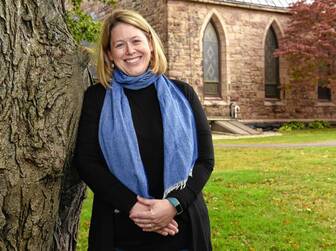 Today we heard the opening verses of Mark’s gospel. It starts: “The beginning of the good news of Jesus Christ, the Son of God.”* Some translations read, “The beginning of the Gospel of Jesus Christ, the Son of God.”* Still other ancient translations lack ‘the Son of God’ at the end of the sentence.* We are one sentence into the gospel, and there is already so much we could unpack! All this is to say, we are looking at an ancient text, that is living and breathing, and always has new insights to offer us. As our United Church of Christ friends like to say, “God is still speaking.” When we think of the gospels, we tend to think of books. Yet when this text first came into being it was something much more provocative. It was a text that proclaimed the Gospel of Jesus Christ over and against the more widely accepted, or at least tolerated, Gospel of Caesar.* Mark is proclaiming Jesus as a kind of Messiah figure over and against Caesar. Listeners have to decide what sort of Messiah Jesus might be: Royal? Priestly? Prophetic? Salvific? Peaceful? Maternal?*Right off the bat, Mark is turning the world as people knew it upside down and right side up again with Jesus’ message. Mark’s action packed, direct, and brief gospel is urgently proclaiming there is good news to hear NOW. In the next two verses, Mark grounds his narrative in the prophets. While our translation names one prophet, specifically Isaiah; other ancient texts simply refer to ‘in the prophets’.* This explains why Mark pulls from both Malachi and Isaiah (Mal 3:1; Isa 40:3).* Scholars think he drew his reference from a testimonia, which was a collection of verses on a common theme; in this instance ‘God’s way.’* Mark tells of a new prophet, reminiscent of Elijah, who is preparing God’s way. ‘Way’ was a technical term in Greek, Jewish, and Christian discourse.* It generally meant choosing the good or better path, albeit difficult, instead of the immoral or easy path. We know from Acts of the Apostles that early believers did not call themselves Christians, but rather people ‘belonging to the way’(9:2). It is why we talk about the ‘Way of Love’. And why in Mark’s gospel, John the Baptist is proclaiming the ‘Way of Jesus’.* John’s primary tool for ‘preparing the way’ was a form of baptism. Water purification rituals had already been on the rise, as they offered cleansing after a period of impurity.* These rituals supported the Jewish community as they lived into the cleanliness and purity laws outlined in the Torah.*For example, following menstruation or coming in contact with a deceased person, one might partake in a water purification ritual.* That said, John the Baptist took a water purification ritual and gave it new symbolic meaning to forgive sins. The end result was that droves of people were coming to see him in the wilderness. Mark writes: “John was baptizing in the wilderness, proclaiming a baptism of repentance for the forgiveness of sins. And people from the whole Judean countryside and all the people of Jerusalem were going out to him and were baptized by him in the river Jordan, confessing their sins.” It’s quite curious. What was it about John the Baptist, his message, and this ritual that was so attractive to the masses? Commentator Timothy Adkins-Jones speculates why. He writes “[John the Baptist’s] location in the wilderness and his peculiar clothing did signal a certain kind of prophetic bona fides. His camel-hair frock and leather belt would have signified a connection to Elijah. The peculiar diet, locusts and honey, also would have nodded to Elijah as they demonstrated a kind of desperate dependence on God for sustenance that mirrors what Elijah went through by the brook Cherith.”** He goes on to say: “One thing that seems clear…is that the people were passionate about something that would affect them right then and there. This was not a baptism or even evangelism that pointed toward an afterlife; they were rushing to the wilderness for something that would change their lives at that moment… The people were excited not only about getting to John, receiving the baptism, but also about confessing their sins. It seems that the combination of the baptism ritual and the confession of their sins was a cleansing process that allowed them to return to their communities not only with a newfound commitment to their faith but also free of the burden of those sins.”** And all the while giving people hope by alluding something more was to come, one even greater than he who would baptize with the Holy Spirit. John was offering something people were desperate for: the release, grace, forgiveness, and new beginning that we receive whenever we genuinely confess our sins and seek to start again. That is why droves of people were headed into the wilderness for this ritual. There was a new awareness that we do not need to go through this life carrying the heavy burdens of our mistakes, shame, and brokenness. Because when we let that keep us down in the spiritual gutter it limits our capacity to keep growing in faith and to love our neighbor as we love ourselves. After all, when we are unable to love ourselves, we limit our ability to authentically love our neighbor. John was offering them redemption, hope, and the joy of beginning again. One of the things I love about our tradition is that in most of our liturgies we have a confession of sins. We confess our brokenness and mistakes not because of our awfulness, but because of our humanness. If we are to be authentically human, and be in a relationship, it means we are going to take risks, make mistakes, hurt one another, and fall short. Our liturgy celebrates this as part of the human experience, and recognizes our need to offer those tender burdens to God as an offering. And in turn God offers us whatever it is we most need in that moment: absolution, compassion, grace, forgiveness, love, hope, joy, peace, abundance of life, and so on… Walter Brueggeman writes in prayer, “We carry old secrets too painful to utter too shameful to acknowledge too burdensome to bear, of failures we cannot undo, of alienations we regret but cannot fix, of grandiose exhibits we cannot curb. And you know them. You know them all. And so we take a deep sigh in your presence, no longer needing to pretend and cover up and deny. We mostly do not have big sins to confess, only modest shames that do not fit our hoped-for selves. And then we find that your knowing is more powerful than our secrets. You know and do not turn away, and our secrets that seemed too powerful are emptied of strength, secrets that seemed too burdensome are now less severe… …We long to be fully, honestly exposed to your gaze of gentleness. In the moment of your knowing we are eased and lightened, and we feel the surge of joy move in our bodies…”*** Brueggemann writes of the discovery we experience on repeat if we are open to it.Each time we offer our tender wounds and burdens to God in confession, we make space within ourselves to receive whatever it is we need most from God at that moment: being seen and known, accepted and loved, always and forever. Changed once again by God’s loving embrace, and living that change with those around us. We know that this season of Advent is a time of getting ready. Last week we spent some time getting ready by proclaiming where we see hope, and our answers will continue to grace the door of our sanctuary this Advent and Christmas. Today, I’m going to ask us to do another wild and risky thing - and then I promise, no more activities, at least until next year! I want to invite us into a couple of minutes of quiet reflection so we might consider:
Our ushers are going to give you a couple of slips of paper, and if you are comfortable doing so, I would encourage you to write down a word, phrase, or symbol that reflects your answers. Then either hand them to an Usher or come forward and staple yours onto our paper chain, and if you're more comfortable, the confession could be on the inside. This chain will decorate our altar rail as a symbol of our offering and gratitude to God that will be here through Advent and Christmas season. For those joining us online, please feel free to add them to the comment section or send me an email so they can be added to the paper chain. (Silence, reflection, & activity) This is one more small way that we continue to ready ourselves for the coming of the Christ-child. We offer this all to Your Glory, O God. Amen. * The Jewish Annotated New Testament (pg 69-70). ** https://www.workingpreacher.org/commentaries/revised-common-lectionary/second-sunday-of-advent-2/commentary-on-mark-11-8-6 *** From Whom No Secrets Are Hid, Prayers for a Privileged People, pg 7-8 By Rev. Heather J. Blais, Rector 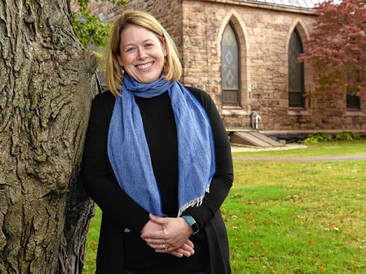 Today we begin a new church calendar year with the season of Advent. This is a season of anticipation. Anticipation that will be symbolized in…
Over the next four weeks, we will watch the shadows lengthen. We will eagerly await and remember…
In recent weeks, we’ve been reflecting on our shared Christian hope, and how we wait faithfully, as we live into the vast expanse of time between Jesus’ life, death, and resurrection and the end of time when God’s purpose for this world will be fulfilled. Today’s gospel lesson pushes us to take waiting faithfully a step further. The passage takes place in Jesus’ final days. He is reminding the disciples to be alert, as he’s already told them everything they need to know about the completion of God’s purpose on earth. He then uses the fig tree as an example of what signs to look for, and then immediately shifts into another example that is vague - leaving listeners a bit confused about what signs they are to be looking for exactly. Commentator Timothy Adkins-Jones suggests this mixed messaging is actually offering listeners some very concrete advice: “...we are to stay ready so that we don’t have to get ready.”* In other words, we are called to embrace our faith each and every day. We are to live into the rituals and rhythms of prayer, community, and outreach. We are to embody the Way of Love, and to hold onto our shared Christian hope, knowing one day, God’s dream of peace, justice, and love will come to fruition. Our diocese recently held a webinar, featuring the Rev. Dr. Jesse Zink, principal at Montreal Diocesan Seminary.** Some of you may have met Rev. Zink, as he grew up in our diocese at St. John’s in Northampton. In the webinar, Rev. Zink spoke with diocesan leaders about hope in the face of a world afflicted with multiple crises. While I commend you to watch it, and will post a link to it with this sermon, I want to share a few of his observations. Rev. Zink began by sharing a relatively new term, polycrisis, which is when crises in multiple global systems become casually entangled in ways that ‘degrade humanity’s prospects’. We regularly pray about these crises: the intensifying conflicts around the globe; the climate crisis; widespread human migration; and the complications and challenges of a consumer driven economy. He asked us: What does it mean to proclaim Christian good news in a time of polycrisis? How do we live out our shared Christian hope? Rev. Zink reminded us that our hope is based on the knowledge and belief that God has acted, God is acting, and God will act in the future. We trust that God will bring about peace, and we hold onto this promise. The question the Church has faced in every generation is: How do we live now in light of what we believe God will do? Rev. Zink also offered some context on what hope is not.
Rev. Zink went on to remind us that in this polycrisis world, it can be hard to believe in a future. Our challenge is to not give into cynicism and despair, as it is not what the Gospel calls us into. The Gospel reminds us we are a people of the Way of Love, and we trust in the knowledge that there is a future, and it is a future worth living for. And this hope shapes our actions and our life now. However, it doesn't magically make things better. In fact, Rev. Zink defined hope as: “... a gritty, engaged, hanging-on-by-the-fingernails, no-options-left ethic for a world that feels uncertain and out of control.” Rev. Zink left us with some advice on how we might lean into our shared Christian hope. He encouraged us to look to the ministry of Jesus of Nazareth:
Rev. Zink’s reflections on hope in a crisis shaped world felt very timely. Everyday we are reminded of the numerous challenges we are facing on a global and national scale, and it is indeed very hard to not become snarky and cynical. Maybe even more burdensome are the personal challenges we carry, and the temptation to do so in silence and isolation. We struggle with the challenges of caregiving, anxiety, depression, enduring grief, relationships ending, financial hardship, and a sense of helplessness around the suffering of our loved ones and neighbors. Despair can feel so close at hand. Yet here we are, carving out time to be together as a community in worship. We gather each week, in worship, to remind ourselves we are a people of hope, we trust in God’s promise of a future grounded in peace, justice, and love. We are fed by the scriptures, prayers, eucharist, and time together as a community. We then go out into the world to be agents of hope in a world grappling with despair. We remind ourselves of God’s dream, and we let it inspire how we live, breathe, and move. We are a people of hope. The world is hungry for hope, and we are uniquely poised to share that hope. To that end, I want to invite everyone to take a couple of minutes to reflect on hope.
The Ushers will hand out post its and pens and I invite you to jot down a word, sentence, or drawing that for you symbolizes hope. When you’re ready, please come and post it on this board, or raise your hand and an usher will take it and post it on the board for you. This board will live in our Narthex throughout the Advent and Christmas seasons. So that anyone who passes through these doors, whether it be for a few minutes of silent prayer during the week, or during worship, they will be reminded that there is hope. Dear ones, there was hope in the beginning, there is hope now, and there always will be hope in the Eternal Source of Love. Amen. Mark 13: 24-37 *https://www.workingpreacher.org/commentaries/revised-common-lectionary/first-sunday-of-advent-2/commentary-on-mark-1324-37-6 ** https://www.youtube.com/watch?v=IHE7Css4Ew4 |
We are blessed to have a diversity of preaching voices in our parish. Our guild of preachers is a mixture of lay and clergy. We hope you enjoy the varied voices. Meet our Preachers
All
Archives
July 2024
|
